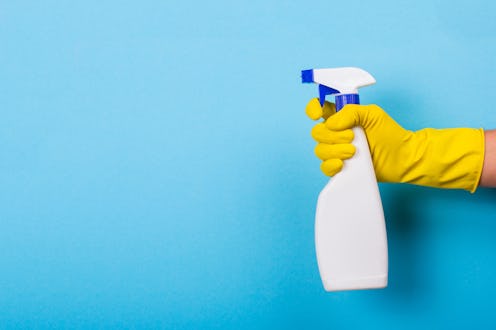(Living)
Yes, Bleach Expires — These Are The Signs It's Time To Replace It

Just like the food in your fridge or makeup in your drawer, the cleaning supplies sitting in your pantry or hall closet expire, too. As you're probably cleaning and disinfecting daily, guaranteeing that your MVP products — like bleach — are actually working is vital during this pandemic. This, in turn, begs the question: Does actually bleach expire? If so, how can one tell it's lost its purpose?
There's no question of the value of bleach at the moment — or ever. In addition to whitening clothing and sanitizing countertops, tile, and the like, the Center for Disease Control and Prevention (CDC) ensures that unexpired bleach is an effective solution for killing the coronavirus when it's diluted properly. It recommends making a solution by mixing five tablespoons of bleach per gallon of water, or four teaspoons bleach per quart of water.
That said, it's important to know that, bleach does in fact expire over time. So, if you're reaching for the dusty bottle you've kept on hand for the past year or so, you might want to opt for a new one. The first rule of thumb to determine your bleach's potency is noting its shelf life. "Generally, bleach has an expiration date of one year, but that doesn’t mean there’s no change for 364 days, and then it drops off the face of the earth," Dr. William Carroll, Jr., Adjunct Professor of Chemistry at Indiana University, tells TZR. "There is some gradual reaction with oxygen in the air, and some gradual reduction in potency by loss to the atmosphere. Bleach might lose up to 20 percent of its potency in a year, so if your bleach is older than that you need to use more to make a disinfecting solution."
Another way to find out if your bleach is still good is its smell. "If you can’t smell it, it’s lost its potency and you should simply flush it down the toilet," Dr. Carroll explains. "If it doesn’t smell as strong as it should, you might need to use a little more in your disinfecting solution." Aside from its shelf life and odor, you can also look on the bottle for an indication of whether the bleach should be disposed of or not. "There's a code showing when it was produced, so you can know how old it is and estimate from there," Dr. Carroll states. (Brands like Clorox, often offer information on their sites or products to help you decode product expiration.)
So what happens if you choose to use expired bleach (or do so without knowing)? Essentially, the solution is probably not going to do you any good. "Bleach will not be as effective at killing germs or whitening clothing after it has expired," says Dr. Samantha Radford, PhD, chemist and founder of parenting blog Evidenced-Based Mommy, to TZR. "Once the sodium hypochlorite, the active ingredient in bleach, decomposes, it turns into table salt and oxygen, which just goes into the atmosphere. So, using expired bleach is basically the same as trying to clean with dilute salt water."
To extend your bleach's shelf life, there are a couple of things you can do. "Storing bleach at cool room temperature, as well as keeping it in a light proof bottle will extend its shelf life," Dr. Radford notes. "In addition, don't dilute bleach for storage if you want it to last a long time."
If you think you’re showing symptoms of coronavirus, which include fever, shortness of breath, and cough, call your doctor before going to get tested. If you’re anxious about the virus’s spread in your community, visit the CDC for up-to-date information and resources, or seek out mental health support.
This article was originally published on